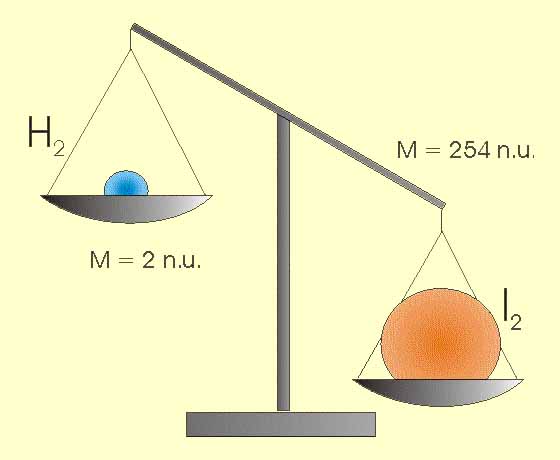How to define the velocity of chemical reaction?
Chemical reactions proceed with different velocities.
The fastest known reaction is 1040 times faster than the slowest.
Transformation of graphite into the diamond in the depths of the Earth is a very slow reaction.
And the explosion of oxygen and hydrogen mixture is almost instant.
A special characteristic was introduced to compare velocities of reactions quantitatively.
It's called rate (or velocity) of the reaction, and is defined as the change of
some parameter in a given time
Rate = change of parameter / time
But which parameter should be taken in order to describe the reaction in the best way?
The first thing that comes to mind is mass. But let's look at the example:
H2 + I2 = 2HI
Let's try to define the velocity of this reaction, in terms of reagent consumption (by mass).
v(H2) = m(H2)/Dt,
v(I2) = m(I2)/Dt
where v - velocity of reaction, m
- decrease of mass of appropriate reagent,
Dt - duration.
This definition has a serious drawback.
The masses of hydrogen and iodine that react with each other in a given
time are not equal! So, v(H2)
not equals v(I2).

Let's try to replace masses for the quantities of substances.
v(H2) = n(H2)/Dt,
v(I2) = n(I2)/Dt
where n
is the quantity of the appropriate reagent (in moles).
As the reaction proceeds with a mole ratio of 1:1, v(H2) = v(I2)
But then again, if we take the decrease of number of moles for hydrogen per 1 ml of mixture,
and for iodine - per 1 litre, velocities would not be equal again.
So, it does depend on volume! If the reaction
is carried in a small test tube, less substance will react in a given time than if
it is carried in a big tank - simply because there is less quantity of reagent
in the tube!
So, the expression should be further modified,
to take the volume of mixture into account.
v(H2) = n(H2)/VDt
= Dc(H2)/Dt,
v(I2) = n(I2)/VDt=Dc(I2)/D t
where Dc is a change of molar
concentration of appropriate substance.Then in that reaction vH2 = vI2 = v,
no matter what the volume is! In this expression value of the reaction's rate doesn't depend on volume!
So, the final definition would be:
The velocity of a chemical reaction is the change of molar
concentration of one of reacting substances in a given period of time:
v = Dc/Dt [mol / litre*sec]
|
There are two nuances to this definition! Check them out?
Supplementary
| 



